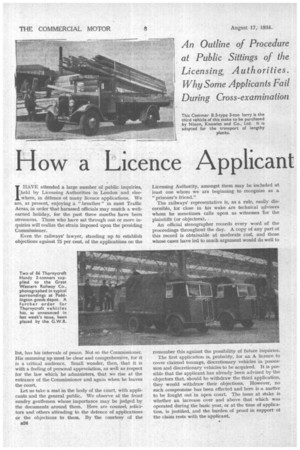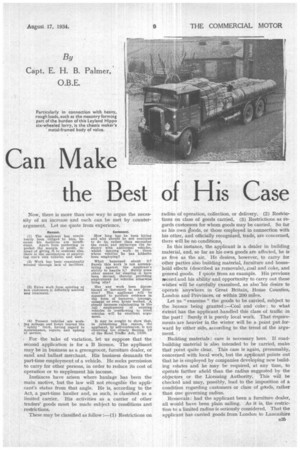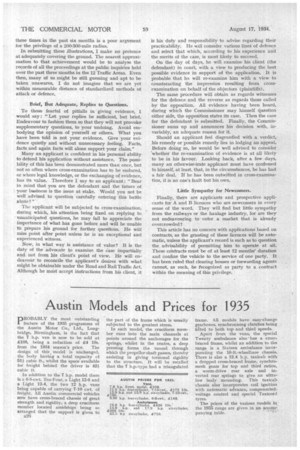How a Licence Applicant Can Make the Best of His Case
Page 38

Page 39

Page 40

If you've noticed an error in this article please click here to report it so we can fix it.
By Capt. E. H. B. Palmer, O.B.E.
IHAVE attended a large number of public inquiries, held by Licensing Authorities in London and elsewhere, in defence of many licence applications. We are, at present, enjoying a " breather " in most Traffic Areas, in order that harassed officials may snatch a wellearned holiday, for the past three months have been strenuous. Those who have sat through one or more inquiries will realize the strain imposed upon the presiding Commissioner.
Even the railways' lawyer, standing up to establish objections against 75 per cent, of the applications on the list, has his intervals of peace. Not so the Commissioner. His summing up must be clear and comprehensive, for it is a critical audience. Small wonder, then, that it is with a feeling of personal appreciation, as well as respect for the law which he administers, that we rise at the entrance of the Commissioner and again when he leaves the court.
Let us take a seat in the body of the court, with applicants and the general public. We observe at the front sundry gentlemen whose importance may be judged by the documents around them. Here are counsel, solicitors and others attending to the defence of applications or the objections to them. By the courtesy of the B24 Licensing Authority, amongst them may be included at least one whom we are beginning to recognize as a "prisoner's friend."
The railways' representative is, as a rule, easily discernible, for close in his wake are technical advisers whom he sometimes calls upon as witnesses for the plaintiffs (or objectors).
An official stenographer records every word of the proceedings throughout the day. A copy of any part of this record is obtainable at moderate cost, and those whose cases have led to much argument would do well to remember this against the possibility of future inquiries.
The first application is, probably, for an A licence to cover claimed tonnage, discretionary vehicles in possession and discretionary vehicles to be acquired. It is possible that the applicant has already been advised by the objectors that, should he withdraw the third application, they would withdraw their objections. However, no such compromise has been effected and here is a matter to be fought out in. open court. The issue at stake is whether an increase over and above that which was operated during the basic year, or at the time of application, is justified, and the burden of proof in support of the claim rests with the applicant.
Now, there is more than one way to argue the necessity of an increase and each can be met by counterargument. Let me quote from experience.
(4) Present vehicles are workIt may be sought to show that,
ing mileage and hirers beyond tho in submitting this reason, the ."
safety' limit, having regard toa pplioant, by self-confession, is not
maintenance, repairs and upkeep observing £ oo closely Section 19
bi service. of the Road Traffic Act, 1930.
; For the sake of variation, let us suppose that the second application is for a B licence. The applicant may be in business as a greengrocer, furniture dealer, or sand and ballast merchant. His business demands the part-time employment of a vehicle. He seeks permission to carry for other persons, in order to reduce its cost of operation or to supplement his income.
Insfa-nces have arisen where haulage has been the main motive, but the law will not recognIie the applicant's status from that angle. He is, according to the Act, a part-time haulier and, as such, is classified as a limited carrier. His activities as a carrier of other traders' goods must be made subject to conditions and
• restrictions.
These may be classified as follow :—(1) Restrictions on radius of operation, collection, or delivery. . (2) Restrictions on class of goods carried. (3) Restrictions as regards customers for whom goods may be carried. So far as his own goods, or those employed in connection with his other, and officially recognized, trade, are concerned, there will be no conditions.
In this instance, the applicant is a dealer in building material, and, so far as his own goods are affected, he is as free as the air. He desires, however, to carry for other parties also building material, furniture and house' hold effects (described as removals), .coal and coke, and general goods. I quote from an example. His previous *cord and his ability and opportunity to tarry out these wishes will be carefully examined, as also--his desire to operate anywhere in Great Britain, Home Counties,
London and Provinces, or within 200 miles. • Let us " examine " the goods to be carried, subject to the licence being granted :—Coal and coke to what extent has the applicant handled this class of traffic in the past? Surely it is purely local work. That requirements are heavier in the winter will be a point put forWard by either side, according to the trend of the argu ment. • Building materials care is necessary here. If roadbuilding Material is also intended to be carried, make that point quite clear. This case is again, presumably, concerned with local work, but the applicant points out that he is employed by companies developing new building estates and he may be required, at any time, to operate farther afield than the radius suggested by the objectors or the Licensing Authority. This will be checked and may, possibly, lead to the imposition of a condition regarding customers or class of gdods, rather than one governing radius.
.Removals: had the applicant been a furniture dealer, all would have been plain sailing. As it is, the restriction to a limited radius is seriously considered. That the applicant has carried goods from London to Lancashire three times in the past six months is a poor argument for the privilege of a 200-300-mile radius.
In submitting these illustrations, I make no pretence at adequately covering the ground. The nearest approximation to that achievement would be to analyse the records of all the proceedings at the public inquiries held over the past three months in the 12 Traffic. Areas. Even then, many of us might be still guessing and apt to be taken unawares. I do not imagine that we are yet within measurable distance of standardized methods of attack or defence.
Brief, But Adequate, Replies to Questions.
To those fearful of pitfalls in giving evidence, I would say : "Let your replies be sufficient, but brief. Endeavour to fashion them so that they will not provoke supplementary questions, to your undoing. Avoid embodying the opinion of yourself or others. What you have been told is not your evidence. Give your evidence quietly and without unnecessary feeling. Facts, facts and again facts will alone support your claim."
Many an applicant is confident in his personal ability to defend his application without assistance. The possibility of this has been demonstrated more than once, but not so often where cross-examination has to be endured, or where legal knowledge, or the exchanging of evidence, has its value. Therefore I. say to an applicant : "Bear in mind that you are the defendant and the future of your business is the issue at stake. Would you not be well advised to question carefully entering this battle alone? '' The applicant will be subjected to. cross-examination, during which, his attention being fixed on replying to unanticipated questions, he may fail to appreciate the importance of what has gone before and will be unable to prepare his ground for further questions. He will miss point after point unless he is an exceptional and experienced witness.
Now, in what way is assistance of value? It is the duty of the advocate to examine the case impartially and not from his client's point of view. He will endeavour to reconcile the applicant's desires with what might be obtainable under the Road and Rail Traffic Act. 'Although he 'mist accept instructions from his client, it is his duty and responsibility to advise regarding their practicability. He will consider various lines of defence and select that which, according to his experience and the merits of the case, is most likely to succeed.
On the day of days, he will examine his client (the defendant) in court, with a view to producing the best possible evidence in support of the application. It is probable that he will re-examine him with a view to counteracting the impression resulting from crossexamination on behalf of the objectors (plaintiffs).
The same procedure will obtain as regards witnesses for the defence and the reverse as regards those called by the opposition. All evidence having been heard, during which the Commissioner may himself question either side, the opposition states its case. Then the case for the defendant is submitted. Finally, the Commissioner sums up and announces his decision with, invariably, an adequate reason for it.
Should an applicant feel disgruntled with a verdict, his remedy or possible remedy lies in lodging an appeal. Before doing so, he would be well advised to consider 'whether the re-examination of evidence is. at all likely ' to be in his favour. Looking back, after a few days, . many an otherwise-irate applicant must have confessed to himself, at least, that, in the circumstances, he has had a fair deal. If he has been outwitted in cross-examination, it is no one's fault but his own.
Little Sympathy for Newcomers.
Finally, there are applicants and prospective applicants for A and B licences who are newcomers in every sense of the word. They will find but little sympathy from the railways or the haulage industry, for are they not endeavouring to enter a market that is already overcrowded?
This article has no concern with applications based on contracts, as the granting of these licences will be automatic, unless the applicant's record is such as to question the, advisability of permitting him to operate at all. These contracts must be of at least 12 months' duration and confine the vehicle to the service of one party. It has been ruled that clearing houses or forwarding agents cannot, as such, be fecognizecl as party to a contract within the meaning of this privilege.




























































































